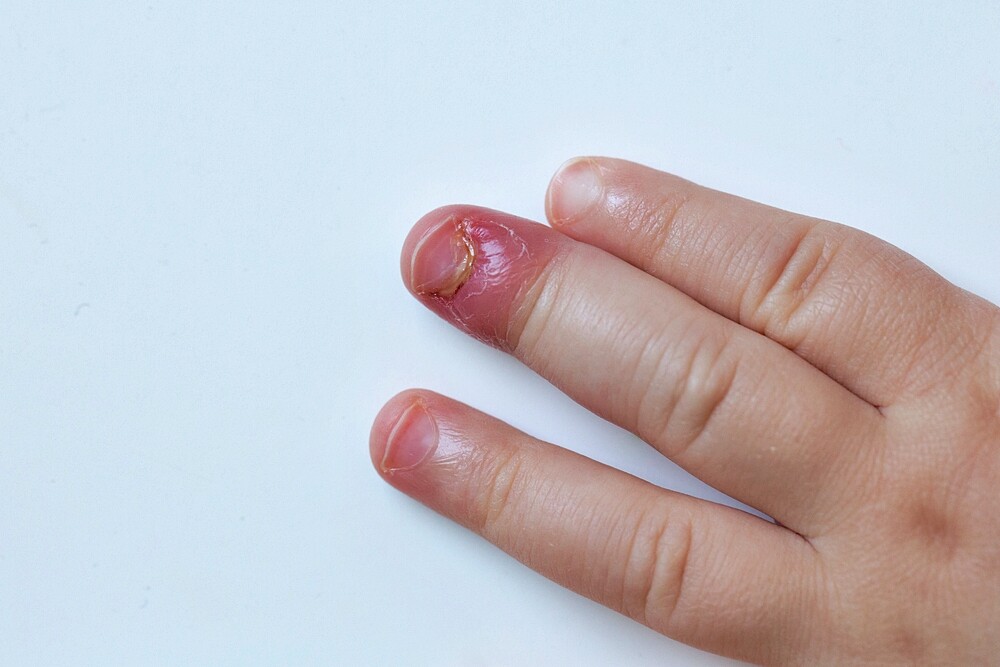It hurts, is sensitive to pressure and simply unpleasant: nail bed inflammation (paronychia). Home remedies can help it to subside – you can find out what they are here.
In addition to the nail plate (what we understand by nail) and the nail bed underneath, the nail also consists of the nail fold and the nail wall. The nail fold is the lateral skin fold around the nail, the nail wall is the section at the root of the nail which is covered by the cuticle.
If the nail bed is inflamed, doctors speak of onychia. If the nail fold or nail wall is particularly inflamed, it is called paronychia. Furthermore, two types of onychia are distinguished: the Panaritium subunguale, where the inflammation runs around the entire nail, and the Panaritium subunguale, where the nail bed is inflamed itself and pus can collect under the nail.
Causes of Paronychia
Pathogens have an easy time of it due to small injuries or skin irritations, because the inflammations are often caused by infections with bacteria such as staphylococci. Although less common, infections can also be caused by skin fungi or herpes viruses or occur as side effects of some drugs. Nail bed inflammation can become chronic. This can happen if there is frequent contact with aggressive chemicals, but also in diabetics or people with a weakened immune system.
Symptoms
The inflammation can occur on the nails of the hands or feet. Symptoms are common:
- Redness
- Overheating
- Swelling
- Pain
- Pulsating throbbing
- Pressure Sensitivity
- Itching
- Pus
Home remedies or going to the doctor?
If the immune system is weakened, it is advisable to consult a doctor at an early stage. Otherwise, if you have a healthy immune system and nail bed inflammation is beginning, you can counteract it with home remedies. However, if the symptoms do not recede after several days, a doctor should be consulted. This can be the family doctor first or the dermatologist (dermatologist).
Home remedies for treatment
It is not difficult to use home remedies for nail bed inflammation. Baths with additives have proven to be a useful home remedy, either as a hand or foot bath:
- Chamomile: Chamomile has an anti-inflammatory effect. To make use of this, brew the flowers with boiling hot water, let it cool down a little and then bathe the affected nails in it.
- Rosemary: Rosemary has a disinfecting, pain-relieving and anti-inflammatory effect. Pour boiling water over the fresh rosemary (approx. 1 teaspoon), let the mixture stand for about ten minutes and bathe your hand or foot in it.
- Table salt: The salt prevents the inflammation from progressing. Dissolve a teaspoon of salt in warm water and bathe the inflamed areas in it.
- Tea tree oil: Put about four drops of tea tree oil and a teaspoon of honey in a glass of water for the bath. The mixture promotes the healing of wounds.
Use the baths twice a day for about 15 to 20 minutes each. Alternatively, a wrapping envelope can help: For example, take a washcloth or a cloth, soak it in chamomile broth and wrap the affected finger or toe in it.
Home remedies that can also help
A tincture of apple vinegar also has an antibacterial and anti-inflammatory effect: add a few drops of apple vinegar to a cotton wool pad and dab the affected area twice a day.
A mask with healing earth has an antibacterial effect and thus supports the healing process. Mix healing earth with some water and apply the paste to the inflamed skin. To prevent the surrounding skin from drying out – and thus further tearing – a small massage with oils helps. Massage lightly into the skin with a few drops of oil. Olive, almond or apricot oil are suitable for this.
Tips for everyday life
To prevent nail bed inflammation, you should cut your nails regularly to prevent them from growing into the skin. You should also be careful with the rest of your nail care: cut the nails rather round, file off possible edges carefully and do not remove the cuticle with scissors (this is how you do it step by step: remove cuticle). Wear gloves when working with chemicals or other activities such as gardening. To avoid pressure points or deformations on the feet, wear shoes that do not constrict. Dry skin should be cared for accordingly, as it can tear more quickly and thus make it easy for pathogens to get in. The same applies to nail-biting.

